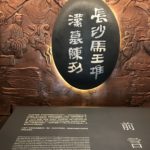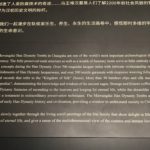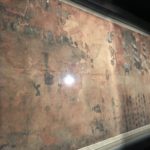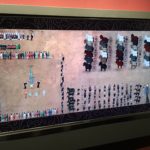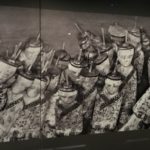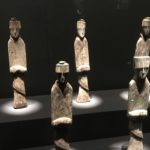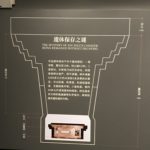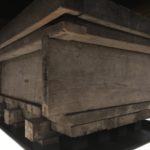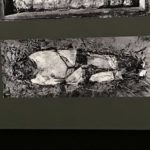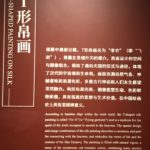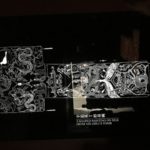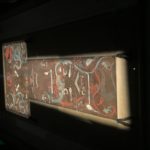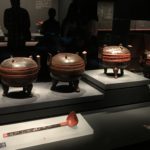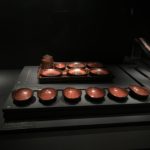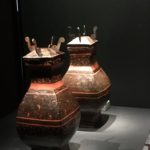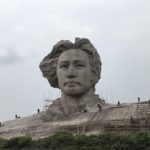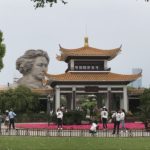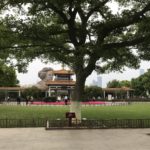Wednesday, April 11, 2018
This day began with a journey back in time, via a visit to the Hunan Provincial Museum in Changsha.
The museum, originally opened in 1951 but closed for a five-year renovation in 2012, features a huge collection of relics from the Mawangdui Han Tombs, which were discovered in Changsha and excavated between 1972-74.
The tombs included the tomb and corpse of Xin Zhui, a 2,000-year old mummified woman who was amazingly well preserved, including flesh and organs (the picture of her won’t do justice because of her body being enclosed in glass, many feet below the viewing area).
Among the other significant relics we saw were a T-shaped colored silk painting, which vividly depicted lives during the Western Han Dynasty (206 BC – 24); click each picture to view it in detail. There simply were too many artifacts to describe here.
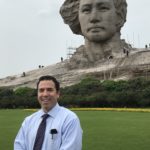 Our afternoon was spent visiting Tangerine Island, which sits in the middle of the Xiangjiang River and runs five kilometers north to south. The island, today, is famous and most known for the 100-foot-high stone head monument of Mao Zedong, the revered communist leader of the People’s Republic of China from the 1940s until his death in 1976. The lore is that when he was young, Mao used to swim out to Tangerine Island to become stronger, physically and mentally.
Our afternoon was spent visiting Tangerine Island, which sits in the middle of the Xiangjiang River and runs five kilometers north to south. The island, today, is famous and most known for the 100-foot-high stone head monument of Mao Zedong, the revered communist leader of the People’s Republic of China from the 1940s until his death in 1976. The lore is that when he was young, Mao used to swim out to Tangerine Island to become stronger, physically and mentally. 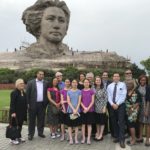 The monument, carved from what appears to be sandstone, is a daunting presence seen on the Island and from afar. The island also features at its head the beautiful Viewing River Pavilion, offering views down the river that depict its size and impact. The pictures of the Mao monument and the pavilion area should help illustrate the beauty of the island.
The monument, carved from what appears to be sandstone, is a daunting presence seen on the Island and from afar. The island also features at its head the beautiful Viewing River Pavilion, offering views down the river that depict its size and impact. The pictures of the Mao monument and the pavilion area should help illustrate the beauty of the island.
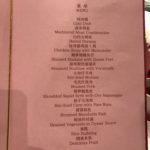 The day that included a look back 2,000 years concluded with more formal celebration of the Changsha–New Haven Sister City agreement. Our delegation was hosted for a closing banquet and yet another inspiring (and spicy!) Hunan dinner by Wen Shu Xun, Chairman of Changsha Municipal Committee of the Chinese People’s Politic Consultative Conference. Mr. Wen visited New Haven this
The day that included a look back 2,000 years concluded with more formal celebration of the Changsha–New Haven Sister City agreement. Our delegation was hosted for a closing banquet and yet another inspiring (and spicy!) Hunan dinner by Wen Shu Xun, Chairman of Changsha Municipal Committee of the Chinese People’s Politic Consultative Conference. Mr. Wen visited New Haven this 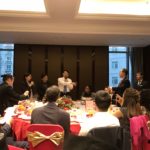 past summer on behalf of the City of Changsha to ink the first formal document in forging the relationship. During the dinner, Mayor Harp and Mr. Wen exchanged remarks and introduced their delegations. The evening was wonderful, and I was fortunate to sit next to Liu Weichao, the principal of Yali School, and Bill Peng, a Consultant with Yale-China.
past summer on behalf of the City of Changsha to ink the first formal document in forging the relationship. During the dinner, Mayor Harp and Mr. Wen exchanged remarks and introduced their delegations. The evening was wonderful, and I was fortunate to sit next to Liu Weichao, the principal of Yali School, and Bill Peng, a Consultant with Yale-China.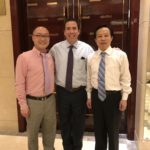 Mr. Peng has been one of our hosts while in Changsha, and in addition to very warm hospitality, he’s extended an offer to assist Albertus Magnus with opening doors in Changsha for student recruitment. The picture I’m posting is of Mr. Peng and Mr. Liu, who also invited Albertus to visit Yali in the future.
Mr. Peng has been one of our hosts while in Changsha, and in addition to very warm hospitality, he’s extended an offer to assist Albertus Magnus with opening doors in Changsha for student recruitment. The picture I’m posting is of Mr. Peng and Mr. Liu, who also invited Albertus to visit Yali in the future.
Another wonderful day in China comes to an end. Tomorrow, we depart via the 300+ mph bullet train for Hong Kong. During my visit in Hong Kong, it appears I am going to have a visit with someone very familiar to our Albertus Magnus community. It’s a surprise I’ll soon share. I look forward to sharing my Hong Kong experience soon.
 President Marc M. Camille, Ed.D., will write regular reflections during his week-long trip to Changsha, China, with New Haven Mayor Toni Harp and the New Haven delegation. The New Haven-Changsha Sister City relationship promotes mutual awareness of cultures, customs, and heritage. Invited by Mayor Toni Harp, President Camille is the only college president from New Haven making the trip.
President Marc M. Camille, Ed.D., will write regular reflections during his week-long trip to Changsha, China, with New Haven Mayor Toni Harp and the New Haven delegation. The New Haven-Changsha Sister City relationship promotes mutual awareness of cultures, customs, and heritage. Invited by Mayor Toni Harp, President Camille is the only college president from New Haven making the trip.

